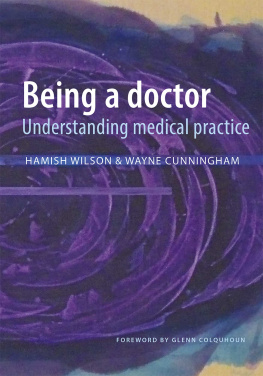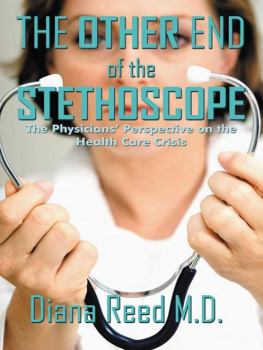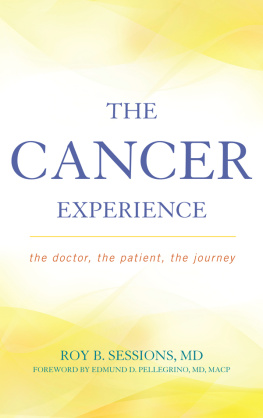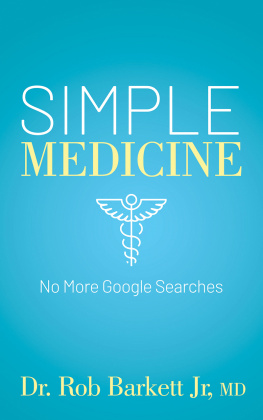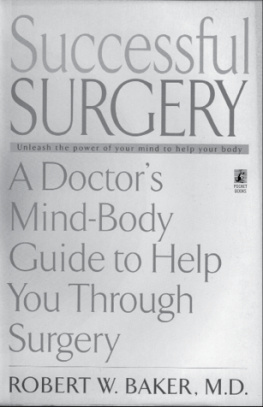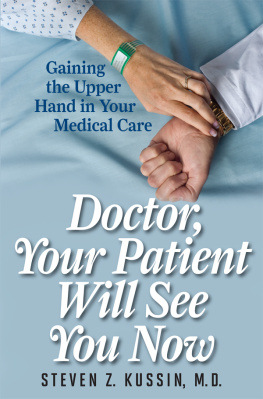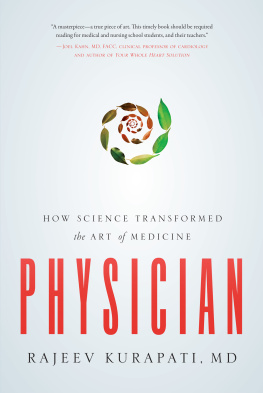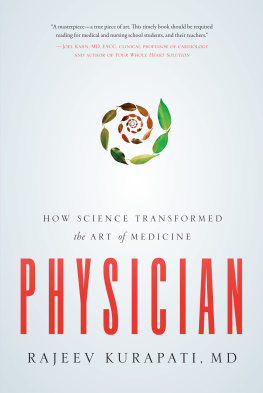ON BECOMING A HEALER
On Becoming a Healer
The Journey from Patient Care to Caring about Your Patients
SAUL J. WEINER, MD

2020 Johns Hopkins University Press
All rights reserved. Published 2020
Printed in the United States of America on acid-free paper
9 8 7 6 5 4 3 2 1
Johns Hopkins University Press
2715 North Charles Street
Baltimore, Maryland 21218-4363
www.press.jhu.edu
Library of Congress Cataloging-in-Publication Data
Names: Weiner, Saul J., author.
Title: On becoming a healer : the journey from patient care to caring about your patients / Saul J. Weiner, MD.
Description: Baltimore : Johns Hopkins University Press, 2020. | Includes bibliographical references and index.
Identifiers: LCCN 2019031190 | ISBN 9781421437811 (paperback ; alk. paper) | ISBN 9781421437828 (ebook)
Subjects: MESH: Physician-Patient Relations | Education, Medical
Classification: LCC R727.3 | NLM W 62 | DDC 610.69/6dc23
LC record available at https://lccn.loc.gov/2019031190
A catalog record for this book is available from the British Library.
Special discounts are available for bulk purchases of this book. For more information, please contact Special Sales at .
Johns Hopkins University Press uses environmentally friendly book materials, including recycled text paper that is composed of at least 30 percent post-consumer waste, whenever possible.
For Simon
ACKNOWLEDGMENTS
This book would not have been conceivable without the inspiration and profound influence of Dr. Simon Auster, a retired family medicine physician, psychiatrist, and educator, to whom it is dedicated. During our many years of conversation, I took copious notes, which have been an invaluable resource. Having suffered a stroke, he is no longer able to read on his own. However, throughout the writing process I often read to him sections of chapters when I needed help. Most important, like many others touched by him, through our relationship I have learned what it is to be healed.
On Becoming a Healer also builds on Listening for What Matters, coauthored with my distinguished colleague and close friend Alan Schwartz, PhD. That empirical work describes more than a decade of research based on thousands of audio recordings of medical encounters, with a focus on the physicians attention (or lack thereof) to the life challenges of their patients when planning their care. Alan, along with a small cadre of research assistantsNaomi Ashley, Amy Binns-Calvey, Benjamin Kass, Brendan Kelly, and Gunjan Sharmaenabled that body of work to come to fruition. On Becoming a Healer stands on these two pillars: the wisdom of Simon and the collective insight and commitment of our team.
In addition, I am grateful to premedical students, medical students, residents, and attending physicians who volunteered to provide feedback on individual chapters, including Ahmeed Aleem, Jillian Caldwell, Camila Castellanos, Pyone David, Benjamin Goldenberg, Anna Gramelspacher, Jacob Grand, Mary Hardin, Augustin Joseph, David Kasjanski, Wasan Kumar, Jessica Lee, Kevin Lee, Caitlin Lopes, Maggie Mass, Wenyu Pan, Agata Parfieniuk, Raj Patel, Jorge Ramallo, Hilary Renaldy, Steven Rothschild, Michelle Sheena, Chris Viamontes, Maya Viner, Jennifer Vu, and Chase Westra. Their helpful feedback from a readers perspective guided my final revisions.
I also acknowledge the US Department of Veterans Affairsparticularly the Center of Innovation for Complex Chronic Healthcare, directed by Frances Weaver these past ten years, and based at Hines VA Hospital and Jesse Brown VA Medical Centersand the University of Illinois at Chicago, the two organizations where Ive concurrently spent my professional career. The former has funded much of the research described, and together they have provided the setting for many of the anecdotes I relate, along with those from my medical school and residency training days. Finally, Id like to acknowledge the Institute for Practice and Provider Performance Improvement (I3PI) and its supporters, particularly the Robert Wood Johnson Foundation, for enabling Alan, me, and our team to utilize unannounced standardized patients, or secret shoppers, to observe health care delivery in the private sector, leading to many of the observations in this book. I would like to emphasize that both the good and the bad incidents were selected to illustrate underlying themes that are broadly generalizable, not because I think they reflect particular characteristics of the institutions and settings where Ive happened to train, practice, and teach medicine or conduct research.
A work as personal and life-spanning as this one draws on too many conversations, friendships, and shared experiences to acknowledge all who contributed by challenging me, sharing an idea, or simply showing the way by example. Special thanks, however, to my wife, Suzanne Griffel, for her meticulous editing of the manuscript, which went far beyond grammar and spelling checks to spotting inconsistencies, lapses in logic, and so forth. In addition, she and my daughter, Karen, lovingly put up with me when I was at less than my bestparticularly when trying to meet deadlinesfor which I am especially grateful.
ON BECOMING A HEALER
Introduction
LIKE MANY aspiring physicians, I felt called to a career in medicine yet knew little about what I was getting into. My first medical school interview was with an amiable rheumatologist in a charmless office at a large, run-down, urban hospital, on a corridor tucked behind an industrial-sized kitchen. As I came in the main entrance, wearing a new suit, I noticed the peculiar corrosive smell of hospital disinfectant, saw elderly patients on gurneys, and felt sad and confused inside. At the time, I couldnt articulate why. The interview was relaxed, friendly, and seemed to go well, which put me in a better mood. Getting to this point had been a long and difficult road for me, so I had every reason to be excited. As I headed home, I was able to push out of my consciousness the uneasebordering on dreadthat Id experienced before the interview. But I sensed it would return.
Id actually had more experience with health care delivery than many aspiring physicians. In high school, I trained and worked as an emergency medical technician on a rural volunteer ambulance squad. I once performed CPR on a farmer who had aspirated chewing tobacco, pushing hard on his chest while trying to keep my balance in the back of the van as the driver, with sirens blaring, whisked us to the emergency department. Shortly after we got there, the man was pronounced dead. I wondered if maybe I could have saved him if I had known more. In college I observed and studied health care in the developing world, spending the summer after my junior year shadowing physicians at clinics and hospitals in Nepal. Throughout, I strategized about what I needed to do to become a doctor. Getting into medical school became an obsession.
Yet, once on the threshold of entering the profession, I wondered silently if I was making a mistake. What hung over me was the feeling that I didnt know if I would be happy with my chosen vocation. I recalled going to see my pediatrician in high school, in a nice office where he saw kid after kid coming in with colds and for school physicals, and feeling a disconnect between what I imagined his job was like and the excitement of being a doctor. His demeanor, which seemed fatherly but distant, may have contributed to my misgivings. It was a trepidation that felt shameful to articulate, as I had already embraced the identity. After all, being a physician is supposed to be a privilege, as one acquires the knowledge and skills to cure disease and alleviate suffering and becomes privy to the intimate lives of patients. While I could exude confidence and enthusiasm about where I was headed, inside I felt like someone who sensed they might be marrying the wrong person.
Next page

